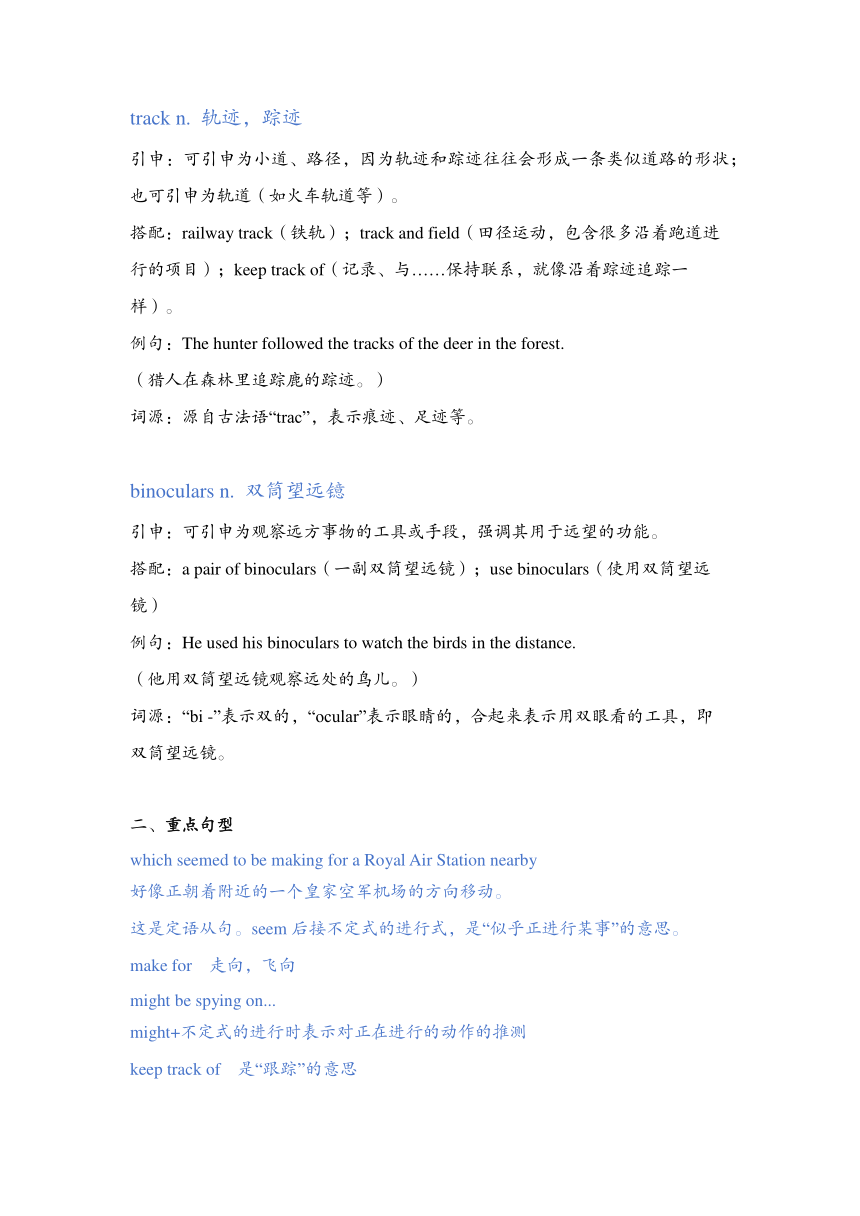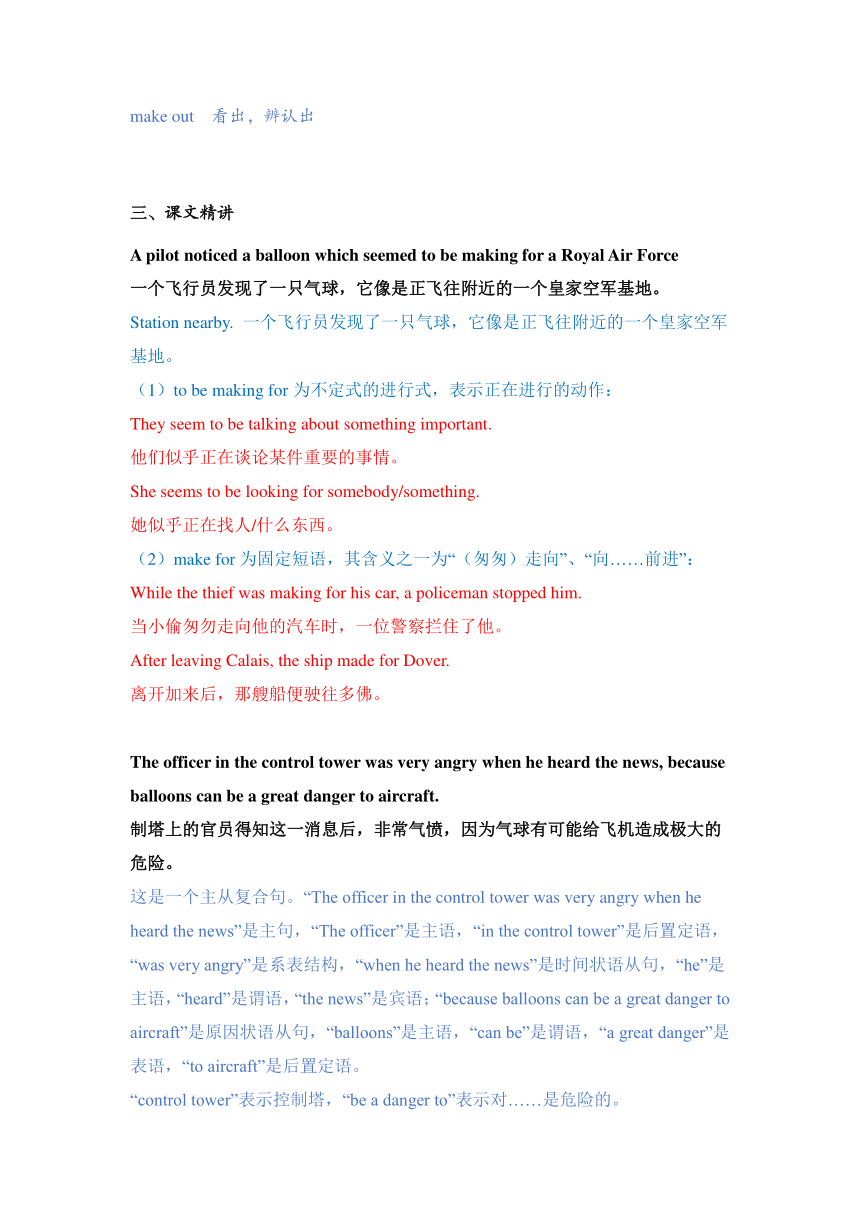新概念第二册Lesson 91 Three men in a basket讲义
文档属性
| 名称 | 新概念第二册Lesson 91 Three men in a basket讲义 |  | |
| 格式 | docx | ||
| 文件大小 | 99.7KB | ||
| 资源类型 | 教案 | ||
| 版本资源 | 新概念英语 | ||
| 科目 | 英语 | ||
| 更新时间 | 2024-11-25 21:06:21 | ||
图片预览



文档简介
新概念第二册
Lesson 91 Three men in a basket
单词精讲
balloon n. 气球
引申:可引申为像气球一样膨胀的东西,例如“balloon payment”(最后一笔数目特大的付款,像气球膨胀到最后爆发一样);也可引申为气球形状的物体。
搭配:hot - air balloon(热气球);balloon flight(气球飞行);balloon animal(用气球做成的动物造型)。
例句:The children are playing with colorful balloons in the park.
(孩子们正在公园里玩彩色气球。)
royal adj. 皇家
引申:可引申为盛大的、高贵的、一流的,与皇家所具有的威严、高贵形象相联系。例如“royal treatment”(贵宾待遇,像对待皇室成员一样的待遇)。
搭配:Royal Family(皇室家族);royal palace(皇宫);royal blue(宝蓝色,一种被认为高贵的颜色)
例句:The royal wedding attracted the attention of the whole world.(这场皇家婚礼吸引了全世界的目光。)
词源:源自法语“royal”,而法语又源自拉丁语“regalis”,与“rex”(国王)有关,表示与国王或皇室相关的。
spy v. 侦察
引申:可引申为暗中监视、窥探秘密等意思。例如“spy on”(暗中监视某人或某地)。
搭配:spy out(侦察出、发现);spy satellite(间谍卫星,用于侦察的卫星)
例句:The agent was sent to spy on the enemy's movements.
(特工被派去侦察敌人的行动。)
track n. 轨迹,踪迹
引申:可引申为小道、路径,因为轨迹和踪迹往往会形成一条类似道路的形状;也可引申为轨道(如火车轨道等)。
搭配:railway track(铁轨);track and field(田径运动,包含很多沿着跑道进行的项目);keep track of(记录、与……保持联系,就像沿着踪迹追踪一样)。
例句:The hunter followed the tracks of the deer in the forest.
(猎人在森林里追踪鹿的踪迹。)
词源:源自古法语“trac”,表示痕迹、足迹等。
binoculars n. 双筒望远镱
引申:可引申为观察远方事物的工具或手段,强调其用于远望的功能。
搭配:a pair of binoculars(一副双筒望远镜);use binoculars(使用双筒望远镜)
例句:He used his binoculars to watch the birds in the distance.
(他用双筒望远镜观察远处的鸟儿。)
词源:“bi -”表示双的,“ocular”表示眼睛的,合起来表示用双眼看的工具,即双筒望远镜。
重点句型
which seemed to be making for a Royal Air Station nearby
好像正朝着附近的一个皇家空军机场的方向移动。
这是定语从句。seem后接不定式的进行式,是“似乎正进行某事”的意思。
make for 走向,飞向
might be spying on...
might+不定式的进行时表示对正在进行的动作的推测
keep track of 是“跟踪”的意思
make out 看出,辨认出
课文精讲
A pilot noticed a balloon which seemed to be making for a Royal Air Force
一个飞行员发现了一只气球,它像是正飞往附近的一个皇家空军基地。
Station nearby. 一个飞行员发现了一只气球,它像是正飞往附近的一个皇家空军基地。
(1)to be making for为不定式的进行式,表示正在进行的动作:
They seem to be talking about something important.
他们似乎正在谈论某件重要的事情。
She seems to be looking for somebody/something.
她似乎正在找人/什么东西。
(2)make for为固定短语,其含义之一为“(匆匆)走向”、“向……前进”:
While the thief was making for his car, a policeman stopped him.
当小偷匆勿走向他的汽车时,一位警察拦住了他。
After leaving Calais, the ship made for Dover.
离开加来后,那艘船便驶往多佛。
The officer in the control tower was very angry when he heard the news, because balloons can be a great danger to aircraft.
制塔上的官员得知这一消息后,非常气愤,因为气球有可能给飞机造成极大的危险。
这是一个主从复合句。“The officer in the control tower was very angry when he heard the news”是主句,“The officer”是主语,“in the control tower”是后置定语,“was very angry”是系表结构,“when he heard the news”是时间状语从句,“he”是主语,“heard”是谓语,“the news”是宾语;“because balloons can be a great danger to aircraft”是原因状语从句,“balloons”是主语,“can be”是谓语,“a great danger”是表语,“to aircraft”是后置定语。
“control tower”表示控制塔,“be a danger to”表示对……是危险的。
He said that someone might be spying on the station and the pilot was ordered to keep track of the strange object. 他说有可能有人正对基地进行侦察,因此命令那个飞行员跟踪那个奇怪的飞行物。
(1)might be doing sth.表示对正在进行的动作的推测(cf.第19课语法):
(2)keep track of 为固定短语,表示“追踪”、“保持联系”、“记录”等(其反义词为 lose track of):
Keep track of the man wearing a grey hat. He looks suspicious to me.
跟踪那个戴顶灰帽子的人。我觉得他看上去可疑。
She managed to keep track of her friends.
她设法保持了与朋友们的联系。
The pilot managed to circle the balloon for some time. He could make out three men in a basket under it and one of them was holding a pair of binoculars.
飞行员设法绕着气球飞了一阵。他看清了气球下面有3个人呆在一只筐里,其中一个举着望远镜。
这是两个句子。“The pilot managed to circle the balloon for some time”中,“The pilot”是主语,“managed to circle”是谓语,表示设法环绕,“the balloon”是宾语,“for some time”是时间状语;“He could make out three men in a basket under it and one of them was holding a pair of binoculars”是并列句,由“and”连接,“He could make out three men in a basket under it”中,“He”是主语,“could make out”是谓语,表示能够辨认出,“three men”是宾语,“in a basket under it”是后置定语;“one of them was holding a pair of binoculars”中,“one of them”是主语,“was holding”是谓语,表示正在拿着,“a pair of binoculars”是宾语。
“manage to do sth.”表示设法做某事,“make out”表示辨认出、看出。
When the balloon was over the station, the pilot saw one of the men taking photographs. Soon afterwards, the balloon began to descend and it landed near an airfield.。
当气球飞临基地上空时,飞行员看见有一个人在拍照。不久,气球开始降落,在一个停机坪附近着了陆。
这是包含主从复合句和并列句的句子。“When the balloon was over the station, the pilot saw one of the men taking photographs”中,“When the balloon was over the station”是时间状语从句,“the balloon”是主语,“was over”是谓语,表示在……上方,“the station”是宾语;“the pilot saw one of the men taking photographs”是主句,“the pilot”是主语,“saw”是谓语,“one of the men taking photographs”是复合宾语,其中“one of the men”是宾语,“taking photographs”是现在分词短语作宾语补足语;“Soon afterwards, the balloon began to descend and it landed near an airfield”是并列句,由“and”连接,“Soon afterwards”是时间状语,“the balloon began to descend”中,“the balloon”是主语,“began to descend”是谓语,表示开始下降;“it landed near an airfield”中,“it”是主语,“landed”是谓语,表示降落,“near an airfield”是地点状语。
“descend”表示下降、降落。
The police were called in, but they could not arrest anyone, for the basket contained two Members of Parliament and the Commanding Officer of the station!
警察被召来了,但他们却不能逮捕任何人,因为筐里是两名国会议员和一名基地的指挥官!
这是一个包含并列句和原因状语从句的句子。“The police were called in, but they could not arrest anyone”是并列句,由“but”连接,“The police were called in”中,“The police”是主语,“were called in”是谓语,表示被叫来;“they could not arrest anyone”中,“they”是主语,“could not arrest”是谓语,表示不能逮捕,“anyone”是宾语;“for the basket contained two Members of Parliament and the Commanding Officer of the station!”是原因状语从句,“the basket”是主语,“contained”是谓语,表示包含,“two Members of Parliament and the Commanding Officer of the station”是宾语。
“call in”表示召集、叫来,“arrest”表示逮捕。
He could make out three men in a basket under it…
他看清了气球下面有3个人呆在一只筐里……
make out是固定短语,它在这里的含义是“(勉强)看出”、“辨认出”、“听出”:
In the darkness of night, he could just make out three men coming toward them.
在黑夜中,他只能看出有3个人在向他们走来。
Can you make out what they are talking about
你能听清他们在谈什么吗?
I can't make out the boss's handwriting.
我辨不出老板的字迹。
The police were called in…警察被召来了……
call in 在这里表示“召来”:
Sam has a temperature. We'd better call in a doctor.
萨姆发烧了。我们最好请医生来。
When he discovered that some important things were missing in his room, he called the police in.
当他发现屋子里少了一些重要东西之后,他便把警察召来了。
As the Commanding Officer explained later, one half of the station did not know what the other half was doing!
正如指挥官后来解释的那样,基地的这半边不知道那半边正在干什么!
这是一个主从复合句。“As the Commanding Officer explained later”是方式状语从句,“the Commanding Officer”是主语,“explained”是谓语,“later”是时间状语;“one half of the station did not know what the other half was doing!”是主句,“one half of the station”是主语,“did not know”是谓语,表示不知道,“what the other half was doing”是宾语从句,“the other half”是主语,“was doing”是谓语。
Lesson 91 Three men in a basket
单词精讲
balloon n. 气球
引申:可引申为像气球一样膨胀的东西,例如“balloon payment”(最后一笔数目特大的付款,像气球膨胀到最后爆发一样);也可引申为气球形状的物体。
搭配:hot - air balloon(热气球);balloon flight(气球飞行);balloon animal(用气球做成的动物造型)。
例句:The children are playing with colorful balloons in the park.
(孩子们正在公园里玩彩色气球。)
royal adj. 皇家
引申:可引申为盛大的、高贵的、一流的,与皇家所具有的威严、高贵形象相联系。例如“royal treatment”(贵宾待遇,像对待皇室成员一样的待遇)。
搭配:Royal Family(皇室家族);royal palace(皇宫);royal blue(宝蓝色,一种被认为高贵的颜色)
例句:The royal wedding attracted the attention of the whole world.(这场皇家婚礼吸引了全世界的目光。)
词源:源自法语“royal”,而法语又源自拉丁语“regalis”,与“rex”(国王)有关,表示与国王或皇室相关的。
spy v. 侦察
引申:可引申为暗中监视、窥探秘密等意思。例如“spy on”(暗中监视某人或某地)。
搭配:spy out(侦察出、发现);spy satellite(间谍卫星,用于侦察的卫星)
例句:The agent was sent to spy on the enemy's movements.
(特工被派去侦察敌人的行动。)
track n. 轨迹,踪迹
引申:可引申为小道、路径,因为轨迹和踪迹往往会形成一条类似道路的形状;也可引申为轨道(如火车轨道等)。
搭配:railway track(铁轨);track and field(田径运动,包含很多沿着跑道进行的项目);keep track of(记录、与……保持联系,就像沿着踪迹追踪一样)。
例句:The hunter followed the tracks of the deer in the forest.
(猎人在森林里追踪鹿的踪迹。)
词源:源自古法语“trac”,表示痕迹、足迹等。
binoculars n. 双筒望远镱
引申:可引申为观察远方事物的工具或手段,强调其用于远望的功能。
搭配:a pair of binoculars(一副双筒望远镜);use binoculars(使用双筒望远镜)
例句:He used his binoculars to watch the birds in the distance.
(他用双筒望远镜观察远处的鸟儿。)
词源:“bi -”表示双的,“ocular”表示眼睛的,合起来表示用双眼看的工具,即双筒望远镜。
重点句型
which seemed to be making for a Royal Air Station nearby
好像正朝着附近的一个皇家空军机场的方向移动。
这是定语从句。seem后接不定式的进行式,是“似乎正进行某事”的意思。
make for 走向,飞向
might be spying on...
might+不定式的进行时表示对正在进行的动作的推测
keep track of 是“跟踪”的意思
make out 看出,辨认出
课文精讲
A pilot noticed a balloon which seemed to be making for a Royal Air Force
一个飞行员发现了一只气球,它像是正飞往附近的一个皇家空军基地。
Station nearby. 一个飞行员发现了一只气球,它像是正飞往附近的一个皇家空军基地。
(1)to be making for为不定式的进行式,表示正在进行的动作:
They seem to be talking about something important.
他们似乎正在谈论某件重要的事情。
She seems to be looking for somebody/something.
她似乎正在找人/什么东西。
(2)make for为固定短语,其含义之一为“(匆匆)走向”、“向……前进”:
While the thief was making for his car, a policeman stopped him.
当小偷匆勿走向他的汽车时,一位警察拦住了他。
After leaving Calais, the ship made for Dover.
离开加来后,那艘船便驶往多佛。
The officer in the control tower was very angry when he heard the news, because balloons can be a great danger to aircraft.
制塔上的官员得知这一消息后,非常气愤,因为气球有可能给飞机造成极大的危险。
这是一个主从复合句。“The officer in the control tower was very angry when he heard the news”是主句,“The officer”是主语,“in the control tower”是后置定语,“was very angry”是系表结构,“when he heard the news”是时间状语从句,“he”是主语,“heard”是谓语,“the news”是宾语;“because balloons can be a great danger to aircraft”是原因状语从句,“balloons”是主语,“can be”是谓语,“a great danger”是表语,“to aircraft”是后置定语。
“control tower”表示控制塔,“be a danger to”表示对……是危险的。
He said that someone might be spying on the station and the pilot was ordered to keep track of the strange object. 他说有可能有人正对基地进行侦察,因此命令那个飞行员跟踪那个奇怪的飞行物。
(1)might be doing sth.表示对正在进行的动作的推测(cf.第19课语法):
(2)keep track of 为固定短语,表示“追踪”、“保持联系”、“记录”等(其反义词为 lose track of):
Keep track of the man wearing a grey hat. He looks suspicious to me.
跟踪那个戴顶灰帽子的人。我觉得他看上去可疑。
She managed to keep track of her friends.
她设法保持了与朋友们的联系。
The pilot managed to circle the balloon for some time. He could make out three men in a basket under it and one of them was holding a pair of binoculars.
飞行员设法绕着气球飞了一阵。他看清了气球下面有3个人呆在一只筐里,其中一个举着望远镜。
这是两个句子。“The pilot managed to circle the balloon for some time”中,“The pilot”是主语,“managed to circle”是谓语,表示设法环绕,“the balloon”是宾语,“for some time”是时间状语;“He could make out three men in a basket under it and one of them was holding a pair of binoculars”是并列句,由“and”连接,“He could make out three men in a basket under it”中,“He”是主语,“could make out”是谓语,表示能够辨认出,“three men”是宾语,“in a basket under it”是后置定语;“one of them was holding a pair of binoculars”中,“one of them”是主语,“was holding”是谓语,表示正在拿着,“a pair of binoculars”是宾语。
“manage to do sth.”表示设法做某事,“make out”表示辨认出、看出。
When the balloon was over the station, the pilot saw one of the men taking photographs. Soon afterwards, the balloon began to descend and it landed near an airfield.。
当气球飞临基地上空时,飞行员看见有一个人在拍照。不久,气球开始降落,在一个停机坪附近着了陆。
这是包含主从复合句和并列句的句子。“When the balloon was over the station, the pilot saw one of the men taking photographs”中,“When the balloon was over the station”是时间状语从句,“the balloon”是主语,“was over”是谓语,表示在……上方,“the station”是宾语;“the pilot saw one of the men taking photographs”是主句,“the pilot”是主语,“saw”是谓语,“one of the men taking photographs”是复合宾语,其中“one of the men”是宾语,“taking photographs”是现在分词短语作宾语补足语;“Soon afterwards, the balloon began to descend and it landed near an airfield”是并列句,由“and”连接,“Soon afterwards”是时间状语,“the balloon began to descend”中,“the balloon”是主语,“began to descend”是谓语,表示开始下降;“it landed near an airfield”中,“it”是主语,“landed”是谓语,表示降落,“near an airfield”是地点状语。
“descend”表示下降、降落。
The police were called in, but they could not arrest anyone, for the basket contained two Members of Parliament and the Commanding Officer of the station!
警察被召来了,但他们却不能逮捕任何人,因为筐里是两名国会议员和一名基地的指挥官!
这是一个包含并列句和原因状语从句的句子。“The police were called in, but they could not arrest anyone”是并列句,由“but”连接,“The police were called in”中,“The police”是主语,“were called in”是谓语,表示被叫来;“they could not arrest anyone”中,“they”是主语,“could not arrest”是谓语,表示不能逮捕,“anyone”是宾语;“for the basket contained two Members of Parliament and the Commanding Officer of the station!”是原因状语从句,“the basket”是主语,“contained”是谓语,表示包含,“two Members of Parliament and the Commanding Officer of the station”是宾语。
“call in”表示召集、叫来,“arrest”表示逮捕。
He could make out three men in a basket under it…
他看清了气球下面有3个人呆在一只筐里……
make out是固定短语,它在这里的含义是“(勉强)看出”、“辨认出”、“听出”:
In the darkness of night, he could just make out three men coming toward them.
在黑夜中,他只能看出有3个人在向他们走来。
Can you make out what they are talking about
你能听清他们在谈什么吗?
I can't make out the boss's handwriting.
我辨不出老板的字迹。
The police were called in…警察被召来了……
call in 在这里表示“召来”:
Sam has a temperature. We'd better call in a doctor.
萨姆发烧了。我们最好请医生来。
When he discovered that some important things were missing in his room, he called the police in.
当他发现屋子里少了一些重要东西之后,他便把警察召来了。
As the Commanding Officer explained later, one half of the station did not know what the other half was doing!
正如指挥官后来解释的那样,基地的这半边不知道那半边正在干什么!
这是一个主从复合句。“As the Commanding Officer explained later”是方式状语从句,“the Commanding Officer”是主语,“explained”是谓语,“later”是时间状语;“one half of the station did not know what the other half was doing!”是主句,“one half of the station”是主语,“did not know”是谓语,表示不知道,“what the other half was doing”是宾语从句,“the other half”是主语,“was doing”是谓语。
同课章节目录
